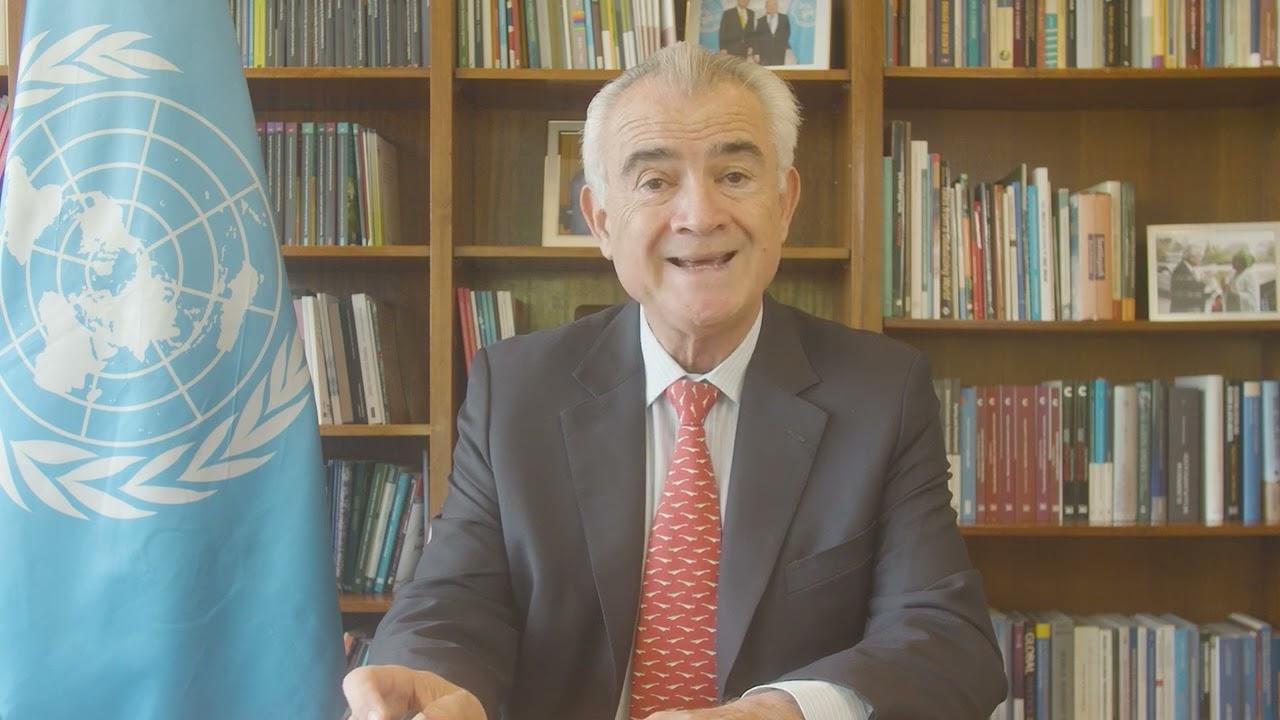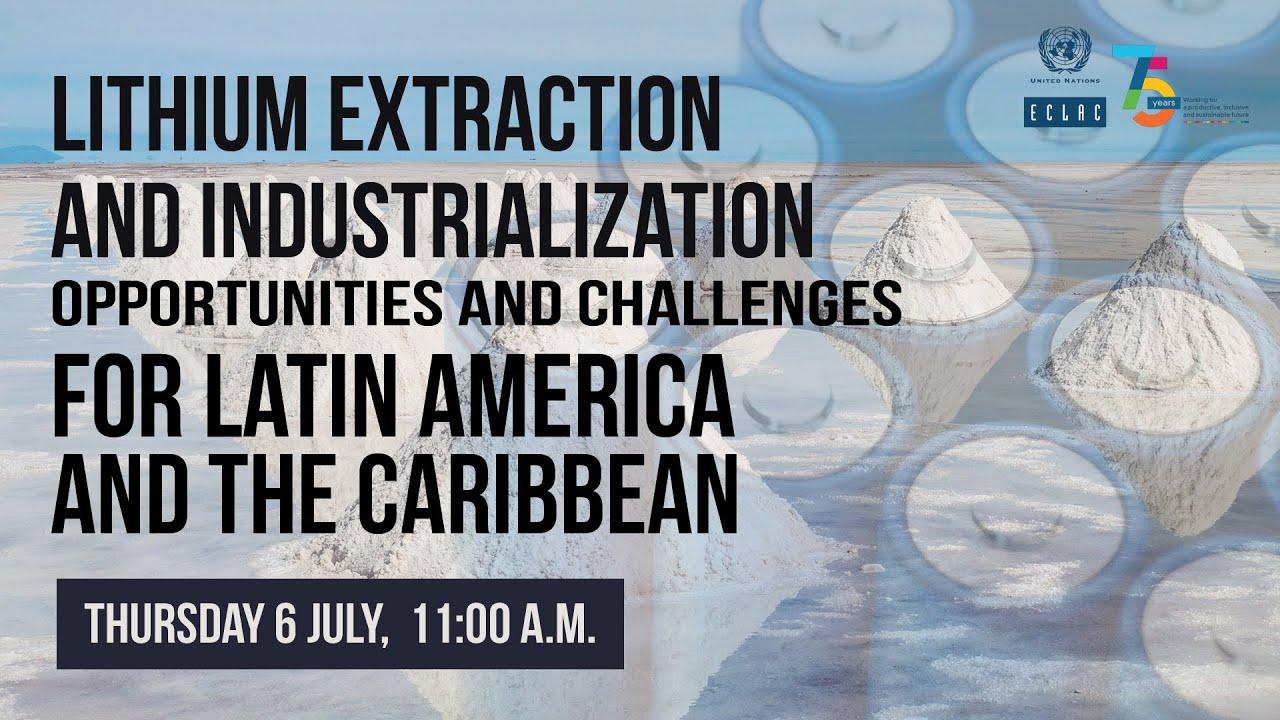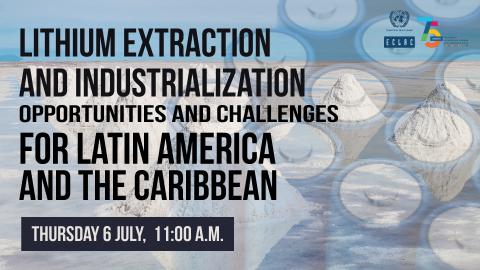video
Lithium is one of the key elements in the energy transition and has been deemed a strategic resource by those countries in the region that have abundant deposits. Consequently, the Economic Commission for Latin America and the Caribbean (ECLAC) stresses the importance of creating a productive development agenda centered on lithium to promote its extraction for use in economic activities directly and indirectly related to the mineral, according to the organization’s new special report unveiled today.
The publication entitled Lithium extraction and industrialization: Opportunities and challenges for Latin America and the Caribbean was presented by the United Nations regional commission’s Executive Secretary, José Manuel Salazar-Xirinachs. In the document, ECLAC examines the role of the region’s lithium-producing countries (mainly Argentina, Brazil and Chile) in the global value chain of lithium-ion batteries (the main use of lithium currently), as well as the governance, regulatory and fiscal regimes that determine how the exploitation of that mineral functions in the “lithium triangle” countries (Argentina, Bolivia and Chile). The report concludes with public policy guidelines that can contribute to a productive development agenda centered on lithium, as well as to the industrialization of this mineral and others in clean technologies for the energy transition and electromobility.
“From the perspective of governments, this requires policies and regulations that are conducive to the creation of public goods, the development of soft and hard capacities and infrastructures, and the mobilization and steering of the necessary resources,” the report underscores.
According to ECLAC, up to now, lithium has been an irreplaceable input for the production of lithium-ion batteries, a key technology for decarbonizing transportation and storing energy generated from renewable sources. Therefore, it can contribute to countries’ economic development via a positive impact based on new value creation, in the form of increased output, exports, employment and tax revenue.
In the region, the resource is considered to be strategic in Argentina, Bolivia, Chile and Mexico, due to its potential for promoting socioeconomic development, value-added and productive linkages that would contribute to a process of structural change in economies.
The report indicates that the identified lithium resources in Latin America and the Caribbean are concentrated in the so-called lithium triangle (56% of global lithium resources). In addition, it is possible to find lithium in smaller quantities in Brazil, Mexico and Peru, which raises the lithium resources found in the region to nearly 60% of global resources. Furthermore, the region is home to 52% of global lithium reserves, located mainly in Chile (41%) and Argentina (10%).
It adds that the fight against climate change, in pursuing the transition to renewable energy and electromobility, is the main engine driving the surge in current and future lithium demand (which could grow 42 times over by 2040, according to the International Energy Agency’s sustainable development scenario). Variable or intermittent renewable energy technologies and electromobility are more mineral-intensive, since they require a greater mass and quantity of minerals.
This jump in demand largely accounts for the exponential increase in the price of lithium and other minerals used in these technologies in recent years. Lithium prices rose nearly ninefold between 2021 and 2022, the document indicates. Geopolitical actors such as China, the United States and the European Union lead electromobility efforts and have a series of policies aimed at ensuring the supply of minerals deemed to be critical for the energy transition.
Only three countries in the region exploit lithium on a large commercial scale. In 2021, Argentina represented 9.8% of global production, Brazil 0.4% and Chile 41%. That same year, the four biggest lithium producers globally (in order of importance: Australia, Chile, China and Argentina) accounted for more than 96% of global production. This high geographic concentration has spurred the countries that produce lithium-ion batteries to include the mineral in their list of critical minerals.
Although the context of the energy transition and the expansion of electromobility present opportunities, they also pose challenges to the countries in the region that are rich in lithium resources. The region has significant participation in the first stage of the lithium-battery value chain (extraction / processing). But in the stages of production of precursors, cathodes/anodes, cells and batteries, China, Japan, the Republic of Korea, the United States and Europe are leading the way.
In this sense, the most immediate possibilities for the region are those arising from lithium extraction and refining: export growth, job creation, increased tax revenue and the forging of upstream productive links (those related to the inputs and equipment needed for lithium exploration and exploitation), ECLAC warns.
Increased participation by the region in downstream segments (meaning the productive processes that use or consume lithium as an input) of cell and lithium-ion battery production is intimately related to the development of a large-scale electric vehicle industry in the region, which would require high levels of financing, access to other minerals deemed to be critical, and human and technological skills.
Separately, lithium extraction poses socioenvironmental challenges, stemming mainly from water consumption in the extractive processes in areas with high water stress, the impact on biodiversity and on the traditional economic activities of social groups living near the salt flats (from which the resources are primarily extracted). To address this, the lithium industry will need stricter regulations and standards to ensure the activity’s sustainability, the report specifies.
Although the governance regimes for this resource adopted in each of the region’s countries differ profoundly, the document formulates a non-exhaustive set of policy guidelines aimed at improving the region’s potential to harness the opportunities offered by lithium and to have better tools for facing the challenges posed by its exploitation.
On matters of environmental and social sustainability, these guidelines refer to the need to ensure that regulations and standards include society’s biggest demands, the need for proper management of socioenvironmental conflicts and for greater transparency and civic participation. On another note, the text also addresses improvements in fiscal regimes to ensure higher revenue and the progressivity, efficiency and equity of taxation, in keeping with competitiveness and greater transparency. Finally, the document highlights the potential and need for regional cooperation and integration to forge a successful joint agenda for lithium value-added and productive linkages in Latin America and the Caribbean.



